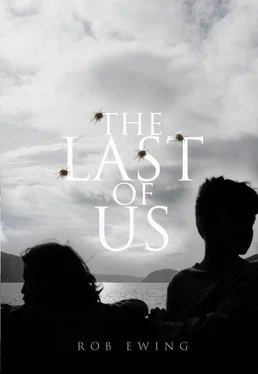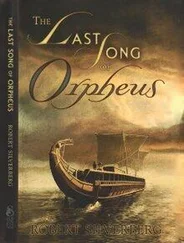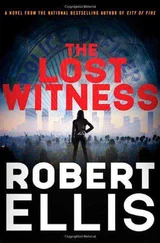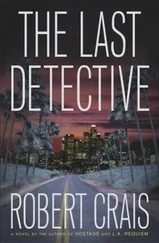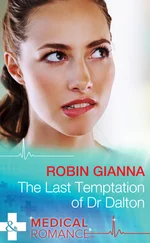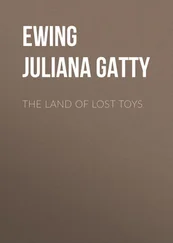Elizabeth puts on her perfume-hanky and goes as close as she dares to see if there’s any insulin on the ground beside him. There isn’t.
We do the rest of our search, quick. In the second bedroom, in a cabinet, Elizabeth finds a box with an insulin pen, and one glass vial.
But it’s empty.
‘It’s only the first house,’ she says. ‘At least we found something, which is a good sign.’
On the way out we stand to pay our respects.
Elizabeth shows me a framed picture she found upstairs: of an old man, smiling beside the school gates. Now we know who it is: Mr Roseberry, the retired headmaster who used to be the teacher for Mum at the big school.
Everyone tries to remember at least one nice thing about him. Duncan goes first: says Mr Roseberry was one of the people who used to tut if you were noisy in the shop.
I remember him as an old man pushing a trolley, buying meat and eggs.
Elizabeth thinks of his eyes being blue.
Calum Ian, though, doesn’t have a memory. Instead, he starts unpacking his rucksack.
Now he’s holding up – what?
A plastic water gun. I recognise it from the Co-op, from a display of toys nobody needs now.
He holds it up – then begins to wet the body of Mr Roseberry. It’s so strange that I nearly want to laugh.
Elizabeth: ‘What are—?’
‘Fucking shut up; keep your eyes peeled for once. This is one way we’ll survive, just you watch.’
‘Is that – petrol ?’
Calum Ian is holding a packet of matches. With the gun he sprays a line on the floor between us and the headmaster.
‘Who wants to light?’
Elizabeth can’t seem to talk, or move – but then she remembers how and tugs at my jumper, pushing Duncan, who’s behind her, back towards the door.
‘Go. Out, quick. ’
So we’re pushed back through the living room: her hand jabbing at our backs, until we’re on the step again, still expecting a flare or a flash from behind, running in case the heat of a fire swallows us up.
In the end there’s no fire. Did he use the spray for show, or just to worry us? Now we’re back on the road.
Calum Ian is showing us the rest of what’s in his backpack.
He unwraps a square of blue tarpaulin. He’s taped it at the edges – making pockets on the inside, from which we can see handles poking out.
The handles are of knives. He slides one out. It’s the sort that Mum used in her kitchen. On the handle of the first knife he’s put a sticker: of the devil, grinning.
There’s another knife: very long and all-silver. This one has a tiny skull-and-crossbones sticker.
Elizabeth stands quite deliberately ahead of me and Alex, blocking us from going too near.
‘The sticker ones are poison-tipped,’ Calum Ian says, sounding casual like it’s normal for knives to be poisoned.
‘What should I say?’
‘Say you’re impressed.’
‘What kind of poison?’
‘Homemade. Stuck them in dirty water I created. If you want to know how to make the water dirty – just look at what the dogs leave on the road.’
Elizabeth stares at him, as if it were opposite-day from how she felt yesterday – when he helped at the surgery, when he went into the gym.
Then she says: ‘I want you to put those away. I want you to wrap them up and get rid of them. Now.’
Calum Ian looks at her with the same hard face, then doesn’t do as she says. Instead, he goes inside another pocket and hands something to Alex and Duncan.
‘Found these in the pub. Darts. Keep them in their wallets till you need. Practise with them, much as you need. For when the time comes.’
Looking at me he says, ‘You’re not to be trusted. So you’re not getting anything.’
I make a rude sign at him, then fold my arms for not caring.
After this he puts away the wrap.
Elizabeth lifts, shrugs on her rucksack: but slowly, still keeping an eye out for what Calum Ian will do next.
‘Are you scared of something?’ she asks.
‘What me, scared? Ha! I’m not scared of anything.’
‘Then let me give you a different question. Why do we need weapons?’
Now he doesn’t answer: instead he looks ahead, to where we’re going, to the road going up over the hill and beyond.
He says, ‘Just dogs. They could’ve gone wild.’
‘We live beside them here. They don’t bother us, not even the ones that kill the cats, chase the sheep.’
‘Only trying to be safe.’
But even I can see – maybe even Alex can see – that he’s only telling half of what’s worrying him.
Past the signpost at the end of town we look back. The cats are dust, the dogs just specks. When I hold up a finger to cover the rubbish on the beach, and the wrecked trawler, everything could be back to normal.
Soon we’ve passed the furthest anyone went on their own. Elizabeth’s furthest mark is a toppled rainbow of fish crates; Calum Ian’s, a rusted van.
We go quick at first but then everything slows down. The bigger kids want to walk at different speeds. Elizabeth goes way out in front, from where she calls on us, pulling Alex’s hand to help him go faster. Calum Ian, meanwhile, is the opposite: he stalks in the fields alongside, calling on Duncan if there’s anything he’s suspicious of or doesn’t understand.
This is why he slows so much at all the dead sheep. One, then another, then another. He thinks it’s too many to be a coincidence – and so he shouts on Elizabeth, who’s forced to come back and look at the nearest: a ram with its neck stuck through a fence.
After dying it turned into a head with no eyes, and straggles of skin and wool behind.
‘There wasn’t a farmer to set it free,’ she explains. ‘After a while it died. End of story.’
She asks him to look at her then says: ‘There’s something you’re not telling us. Right?’
Calum Ian won’t keep looking. Instead, he goes back over the fence, and crouches there, waiting until she moves on before starting up his stalking again.
It takes us all day. Calum Ian holds back, holds back. It gets in me that he’s waiting by the roadside to see if we’ll get into trouble first. Which is not very nice.
At least ten times Elizabeth comes back and shouts on him to speed up, but he won’t: won’t walk the road or walk beside us, even when there’s rocks he has to climb, or lines of fences.
‘We set off too late,’ Elizabeth says. ‘It’s late.’
I forgot how big the world was. Forgot how the west beaches had big waves. Forgot how the sun could be shiny on the sea. Forgot that sand blew in drifts on the road.
And we all forgot the roadblock.
Nobody wants to see it, be reminded. Yet here it is. It truly did happen.
Maybe fifty, maybe a hundred cars jammed together on the uphill beside a cliff. It looks eerie: like all the people of the island were here all along, waiting until we plucked up the courage to come and find them.
For safety we throw stones at the back of the nearest cars for a while. When nothing serious happens, we get close enough to touch the one that’s nearest.
Its tyres went flat, like Mum’s van at home. There’s salt-swirls, dust, bird shit covering the windows.
Up ahead are five big metal baskets, filled with stones and boulders. The baskets are way bigger than us. They’re spread out, right across the road, with the spaces between them only big enough for side-on walking.
‘I saw them put the baskets in here,’ Duncan says. ‘We got stuck on the other side. It was when Mum was trying to get Flora to hospital. It felt like all day.’
‘It was all bloody day,’ Calum Ian says. ‘Then they came and took her anyway. And left us on the bad side.’ Grinning not for fun at Elizabeth he adds: ‘Bet you were on the good side. ’Course you were, being the doctor’s daughter. Only the best for you.’
Читать дальше
Конец ознакомительного отрывка
Купить книгу
